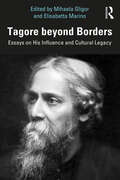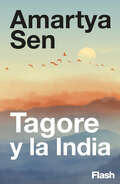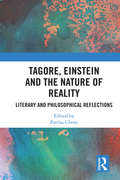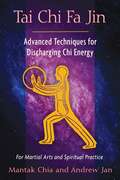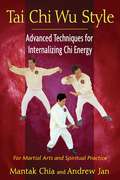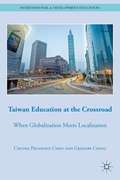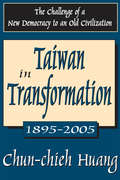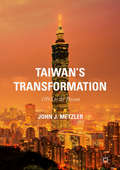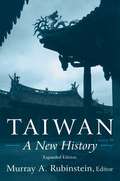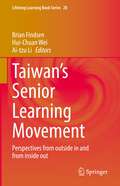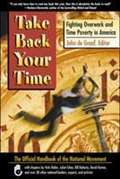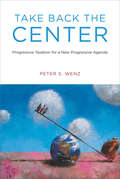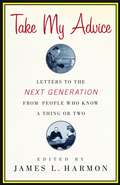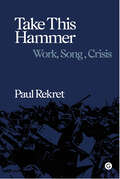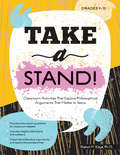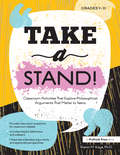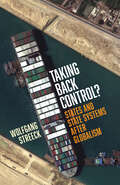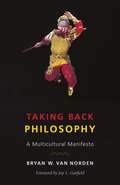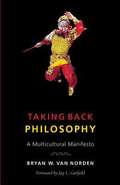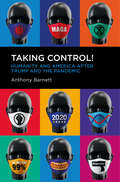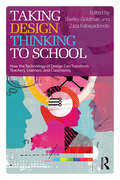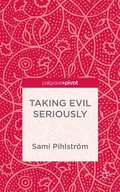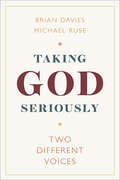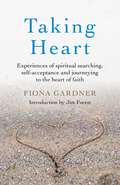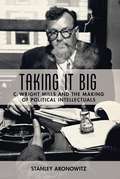- Table View
- List View
Tagore beyond Borders: Essays on His Influence and Cultural Legacy
by Mihaela Gligor Elisabetta MarinoThis book looks at Rabindranath Tagore’s creative art, social commitment, literary and artistic representation and his unique legacy in the cultural history of modern India – as a blend of the quintessentially Indian and the liberal universalist. Tagore’s genius, which he expressed through his poetry, songs, paintings, drama and philosophy, is celebrated across the globe. In 1913, he was awarded the Nobel Prize for Literature for his volume of poetry, Gitanjali (Song Offerings), making him the first Nobel laureate from Asia. This volume of essays celebrates his intellectual engagements and his incredible legacy by discussing the diverse ways in which his works have been reinterpreted, adapted and translated over the years. It analyses his perspectives on modernity, nationalism, liberation, education, post-colonialism and translatability and their relevance today. The leitmotif is a Tagore who, while imaginable as made possible only within the Indian tradition, eludes attempts aimed at identification with a national culture and remains a "cosmopolitan" in the best sense of the term.This volume will be of interest to readers and researchers in the fields of literature, philosophy, political science, cultural studies, Asian studies, South Asian studies and Tagore studies. Fans of Tagore will also find this an interesting read as it presents many little knows aspects of the poet’s work.
Tagore y la India
by Amartya SenUna apasionante semblanza del Premio Nobel de Literatura más desconocido. Premio Princesa de Asturias de las Ciencias Sociales 2021 Premio Nobel de Economía 1998 Existe un auténtico contraste entre la presencia intelectual de Rabindranath Tagore en la literatura, la política y la sociedad bengalíes y su imagen de gurú espiritual que llegó hasta Occidente. Entre ambas facetas se abre un amplio espacio surcado por numerosos debates en torno a la religiosidad, el sistema de castas y la independencia que llevaron a considerarlo en India una de las personalidades más polifacéticas y preeminentes del siglo XXI. Amartya Sen recorre en esta breve semblanza las piedras angulares del argumentario del pensador bengalí, un escritor de elegante prosa y mágica poesía, y redescubre a los lectores occidentales al Tagore más oculto: el concienciado activista, el pintor de enorme talento y el gran estratega político. «Rabindranath sabía que no habría podido brindarle a la India el liderazgo político que Gandhi le confirió, y nunca hubo ironía en su reconocimiento de lo que Gandhi hizo por la nación (de hecho, fue Tagore quien popularizó el tratamiento de Mahatma —alma grande— para Gandhi)».
Tagore, Einstein and the Nature of Reality: Literary and Philosophical Reflections (Routledge Studies In The Philosophy Of Mathematics And Physics Ser.)
by Partha GhoseThis volume consists of a selection of scholarly essays from literature, philosophy and history on the conception of reality as understood by Rabindranath Tagore and Albert Einstein. The nature of reality has been a long-debated issue among scientists and philosophers. Tagore (1861–1941) met Einstein (1879–1955) at the latter’s house in Kaputh, Germany on 14 July 1930 and had a long conversation on this issue. This conversation has been widely quoted and discussed by scientists, philosophers and scholars from the literary world. The important question that Tagore and Einstein discussed was whether the world is a unity dependent on humanity, or the world is a reality independent of the human factor. Einstein believed that reality is independent of the mind and the human factor. On the other hand, Tagore adopted the opposite view. Nevertheless, both Einstein and Tagore claimed to be realists — their conceptions of reality were obviously fundamentally different. Where does the difference lie? Can it be harmonized at a deeper level? This volume brings together for the first time a gamut of views on this subject from eminent scholars. It presents some key reflections on reality, language, poetry, truth, science, personality, human sciences, virtue ethics, intelligibility and creativity. It will be useful to scholars and researchers of philosophy, literature, history and political studies, as also to those interested in Tagore.
Tai Chi Fa Jin: Advanced Techniques for Discharging Chi Energy
by Mantak Chia Andrew JanA guide to the seemingly effortless yet explosively powerful martial art techniques of Fa Jin • Explains how to collect energy within and discharge it for self-defense as well as healing • Explores how to counter the natural instinct to resist force with force and develop yielding softness through the 13 Original Movements of Tai Chi • Illustrates routines for the partner practice of “Push Hands” (Tui Shou) Fa Jin, an advanced yang style of Tai Chi, complements the physical, mental, and spiritual conditioning available through solo Tai Chi practice and the internal martial arts of Taoism. Fa Jin enables adepts to harness the energy of yin, yang, and the earth in the lower tan tien and discharge it as an extremely close-range yet explosively powerful blow in self-defense and partner practice as well as in healing techniques. Integrating the teachings of many Taoist masters, including Chang San-Feng, the creator of Tai Chi; Wang Tsung-Yueh, the legendary 19th-century master; Bruce Lee, the actor and martial artist who made the “one-inch punch” technique famous; and the Magus of Java, a living master able to discharge energy in the form of electric shocks, this book explores the history, philosophy, internal exercises, and physical practices of Fa Jin. Drawing on Iron Shirt Chi Kung and Tan Tien Chi Kung techniques, Master Mantak Chia and Andrew Jan reveal the secrets to collecting yin and yang in the lower tan tien and discharging the energy in a seemingly effortless yet explosive blow. Illustrating several routines of the Tai Chi partner practice of “Push Hands” (Tui Shou), they explain how to apply Fa Jin techniques by “listening” to your opponent’s intentions and countering the natural instinct to resist force with force through yielding softness and redirection. The authors also detail how to prepare for this advanced practice through stretching, meditation, breathing, relaxation, and energetic exercises.
Tai Chi Wu Style: Advanced Techniques for Internalizing Chi Energy
by Mantak Chia Andrew JanA guide to the internal martial arts exercises of short-form Wu-Style Tai Chi • Details the 8 core forms of Wu-Style Tai Chi with fully illustrated instructions • Ideal for older practitioners as well as those with health disabilities due to the “small frame” primary stance, slower and smaller movements, and conservation of energy • Explains how Wu Style provides a natural introduction to martial arts boxing • Reveals how Wu Style eases stiffness, relieves back pain, and reduces abdominal fat Following the flow of chi energy, rather than directing it as in traditional Tai Chi, Wu-Style Tai Chi focuses on internal development, seeking to conserve chi energy and gather jin power from the Earth through the tan tien. Centered on a “small frame” stance--that is, feet closer together and arms closer to the body--and a slower progression of movements in solo practice, Wu Style offers a gentle Tai Chi form for beginners and, when practiced with a partner, a grounding introduction to martial arts boxing and Fa Jin (the discharge of energy for self-defense). The more functional stance, smaller movements, and conservation of internal energy make Wu-Style Tai Chi ideal for older practitioners as well as those with health disabilities. Condensing the 37 movements of Wu Style into 8 core forms, Master Mantak Chia and Andrew Jan illustrate how to build a personal short-form Wu-Style Tai Chi practice. They explain how Wu-Style Tai Chi removes energetic blockages and helps to elongate the tendons, reducing stiffness and allowing the limbs to return to their natural length and full range of motion. Regular practice of Wu Style relieves back pain as well as reducing abdominal fat, the biggest hindrance to longevity. Exploring the martial arts applications of Wu Style, the authors trace its history beginning with founder Wu Chuan-Yu (1834-1902) as well as explain how to apply Wu Style to “Push Hands” (Tui Shou) and Fa Jin. Through mastering the short-form Wu Style detailed in this book, Tai Chi practitioners harness a broad range of health benefits as well as build a solid foundation for learning the complete long-form Wu Style.
Taiwan Education at the Crossroad
by Chuing Prudence Chou Gregory ChingChou and Ching examine the processes of schooling in Taiwan amidst social, cultural, economic, and political conflict resulting from local and global dilemmas. Collectively, these issues offer a panoramic and in-depth glimpse from the past to the future of educational trends in Taiwan.
Taiwan in Transformation 1895-2005: The Challenge of a New Democracy to an Old Civilization
by Chun-chieh HuangThe last decade of the twentieth century witnessed rapid changes not only in global politics but also in Taiwan's quests for new identities. The notorious martial law was lifted in July 1987, and long-repressed calls for democratization began to be heard that caught worldwide attention. In tandem with economic transformation, the entire world of thought in Taiwan underwent significant changes. Both economic and ideological restructuring have been basic elements of transformation in postwar Taiwan. However, rapid democratization has opened a Pandora's box, and stirred a whirlwind of discord.This volume elaborates on the "where from" and the "where to" of the Taiwan transformation and attempts to answer such questions as: Is the old Taiwanese work ethic just a relic of the past? Is Taiwan going to become an Armageddon of ideological wars?Chapters deal with the vicissitudes of Taiwanese nostalgia for cultural China; postwar Taiwan in historical perspective, in particular the rise and fall of the agrarian culture; the transformation of farmers' social consciousness in the period 1950-1970; Confucianism in postwar Taiwan: historical, philosophical, and sociological; the case of Hsu Fu-kuan, which provides an epic case of the intertwining of cultural crisis with personal crisis; the development and metamorphoses of Taiwanese consciousness in the unfolding political context, the awakening of the "self"; and finally "mutual historical understanding" as the basis for Taiwan-Mainland relations in the twenty-first century.Taiwan in Transformation seeks to show that historical insights extrapolated from an understanding of history are essential for grasping and solving the basic problems facing Taiwan at present, including the Taiwan-Mainland relationship in the twenty-first century. It will be of interest to Chinese area specialists, sociologists, and historians.
Taiwan's Transformation: 1895 to the Present
by John J. MetzlerThis book presents a cogent but comprehensive review of Taiwan’s socio-economic transformation from a Japanese colony to a thriving East Asian mini-state. Since the 1980’s, Taiwan has primarily been viewed as a thriving economic model. Though certainly true, this assessment belies the amazing social and political success story for 23 million people on a small New Hampshire-sized island just off the China coast. Metzler highlights the engaging political narrative of democratization as well as Taiwan’s noteworthy accomplishments despite the proximity and opposition of communist China. Further, the result of the 2016 elections and its implication are analyzed. Scholars studying East Asia and policy makers will gain a greater appreciation for the island’s dynamic, prosperous resilience, despite pressure from China.
Taiwan: A New History (Taiwan In The Modern World Ser.)
by Murray A. RubinsteinThis is a comprehensive portrait of Taiwan. It covers the major periods in the development of this small but powerful island province/nation. The work is designed in the style of the multi-volume "Cambridge History of China".
Taiwan’s Senior Learning Movement: Perspectives from outside in and from inside out (Lifelong Learning Book Series #28)
by Brian Findsen Hui-Chuan Wei Ai-Tzu LiThis volume provides an in-depth analysis of historical and recent developments of senior learning in Taiwan, where publications in English have been scant. It takes a broader view on lifelong learning and active ageing from a theoretical/conceptual base written by prominent international authors- this represents the ‘outside in’ perspective. The ‘inside out’ on the other hand signifies an in-depth investigation of initiatives written by authors from Taiwan who are closely involved with developments in policy and practice. The volume is situated theoretically in the intersection of complementary concepts such as lifelong learning, active ageing, later life learning, learning communities and social movements. It is located geographically and culturally in East Asia where senior learning/education is expanding in response to large populations of older adults and concerns about their physical and social well-being. It is argued that Taiwan is leading the way in terms of innovation and community engagement in regard to older adult learning/education and can thus serve as a model for neighboring countries. By analyzing historical precedents, cultural dynamics, policy trends, research sub-fields and community engagement this book is of interest to both East Asian and Western scholars, practitioners, policy-makers and students amongst the fields of lifelong learning, social gerontology and educational psychology.
Take Back Your Time: Fighting Overwork And Time Poverty In America
by John De GraafThe book is timed to publicize Take Back Your Time Day on October 24, 2003, this date intended to highlight that Americans typically work nine weeks longer than Western Europeans. The collection comprises 30 essays by people like Cecile Andrews, author of "Circle of Simplicity"; Kirk Warren Brown, psychology, U. of Rochester; David Korten, author of "When Corporations Rule the World"; Christine Owens of the AFL-CIO; and Camilla Fox of the Animal Protection Institute in Sacramento (Ms. Fox argues that overwork means neglect of pets). Other contributions include short essays (with even shorter editorial introductions) addressing such topics as making the right pitch to supervisors for reduced time, "overemployment" (being forced to work longer than one wants), and overwork's impact on community and the environment.
Take Back the Center: Progressive Taxation for a New Progressive Agenda (The\mit Press Ser.)
by Peter S. WenzReality-based arguments against right-wing fantasies: the case for reducing income inequality, rebuilding our infrastructure, investing in education, and putting people back to work.Midcentury America was governed from the center, a bipartisan consensus of politicians and public opinion that supported government spending on education, the construction of a vast network of interstate highways, healthcare for senior citizens, and environmental protection. These projects were paid for by a steeply progressive tax code, with a top tax rate at one point during the Republican Eisenhower administration of 91 percent. Today, a similar agenda of government action (and progressive taxation) would be portrayed as dangerously left wing. At the same time, radically anti-government and anti-tax opinions (with no evidence to support them) are considered part of the mainstream. In Take Back the Center, Peter Wenz makes the case for a sane, reality-based politics that reclaims the center for progressive policies. The key, he argues, is taxing the wealthy at higher rates. The tax rate for the wealthiest Americans has declined from the mid-twentieth-century high of 91 percent to a twenty-first-century low of 36 percent—even as social programs are gutted and the gap betweeen rich and poor widens dramatically.Ever since Ronald Reagan famously declared that government was the problem and not the solution, conservatives have had an all-purpose answer to any question: smaller government and lower taxes. Wenz offers an impassioned counterargument. He explains the justice of raising the top tax rates significantly, making a case for less income inequality (and countering society's worship of the wealthy), and he offers suggestions for how to spend the increased tax revenues: K-12 education, tuition relief, transportation and energy infrastructure, and universal health care. Armed with Wenz's evidence-driven arguments, progressives can position themselves where they belong: in the mainstream of American politics and at the center of American political conversations, helping their country address a precipitous decline in equality and quality of life.
Take My Advice
by James L. HarmonTake Their Advice: Camille Paglia Wayne Koestenbaum Jonathan Ames Jennifer Belle Howard Zinn Joe Dallesandro Bruce LaBruce Dr. Laura Schlessinger Tom Robbins Judith Butler Martha Nussbaum Horst William S. Burroughs Larry Niven Veruschka Lydia Lunch Spalding Gray Eileen Myles Roger Scruton Ken Kesey Mary Gaitskill Richard Powers Mark Dery Florence King Mark Simpson Bob Shacochis Joanna Scott Quentin Crisp Carolyn Chute Michael Thomas Ford Alexander Theroux George Saunders Charles Baxter Ian Shoales Fay Weldon Bruce Benderson Scott Russell Sanders John Shirley Dr. John Money Cindy Sherman Richard Meltzer Gene Wolfe Abbie Hoffman Diane Wakowski Richard Taylor Bette Davis Arthur Nersesian Jim Harrison Martha Gellhorn Lucius Shepard Dan Jenkins Steve Stern Murray Bookchin John Zerzan Maurice Vellekoop Joel-Peter Witkin Stewart Home Maxx Ardman Katharine Hepburn Bret Lott Lynda Barry Alain de Botton Mary McCarthy Hakim Bey Anita O'Day Chris Kraus R. U. Sirius C. D. Payne W. V. Quine Rita Dove Robert Creeley Valerie Martin Paul Krassner Alphonso Lingis Mark Helprin John Rechy Ram Dass William T. Vollmann and Bettie Page
Take This Hammer: Work, Song, Crisis (Goldsmiths Press / Sonics Series)
by Paul RekretA study of contemporary music in light of transformations to work and social life.The emergence of the popular music industry in the early twentieth century not only drove a wedge between music production and consumption, it also underscored a wider separation of labor from leisure and of the workplace from the domestic sphere. These were changes characteristic of an industrial society where pleasure was to be sought outside of work, but these categories have grown increasingly porous today. As the working day extends into the home or becomes indistinguishable from leisure time, so the role and meaning of music in everyday life changes too. In arguing that the experience of popular music is partly conditioned by its segregation from work and its restriction to the time and space of leisure—the evening, the weekend, the dancehall—Take This Hammer shows how changes to work as it grows increasingly precarious, part-time, and temporary in recent decades, are related to transformations in popular music. Connecting contemporary changes in work and the economy to tendencies in popular music, Take This Hammer shows how song-form has both reflected developments in contemporary capitalism while also intimating a horizon beyond it. From online streaming and the extension of the working day to gentrification, unemployment and the emergence of trap rap, from ecological crisis and field recording to automation and trends in dance music, by exploring the intersections of work and song in the current era, not only do we gain a new understanding of contemporary musical culture, we also see how music might gesture towards a horizon beyond the alienating experience of work in capitalism itself.
Take a Stand!: Classroom Activities That Explore Philosophical Arguments That Matter to Teens
by Sharon KayeTake a Stand! (grades 9–12) helps teens develop critical thinking skills by examining debates on issues directly relevant to their lives (that you won't find in most classroom materials). Each chapter:Covers an important topic relating to electronics, sex, mental health, and relationships.Presents a question for debate, such as "Should kids choose their own religion?" and "Is it possible to love more than one person?"Shows how each issue might arise in an ordinary teen conversation.Presents and explores two or more opposed answers to philosophical debates.Encourages high school students to develop their own positions while learning to appreciate other perspectives.Throughout the book, the chapter contributors—all current or recent teens themselves—highlight key definitions, quote compelling sources, and diagram the central arguments. Each chapter includes discussion questions to guide arguments, as well as helpful sidebars and illustrations to increase comprehension. Perfect for inspiring classroom discussion of topics that matter to today's teens.
Take a Stand!: Classroom Activities That Explore Philosophical Arguments That Matter to Teens
by Sharon M. KayeTake a Stand! (grades 9-12) helps teens develop critical thinking skills by examining debates on issues directly relevant to their lives (that you won't find in most classroom materials). Each chapter:Covers an important topic relating to electronics, sex, mental health, and relationships.Presents a question for debate, such as "Should kids choose their own religion?" and "Is it possible to love more than one person?"Shows how each issue might arise in an ordinary teen conversation.Presents and explores two or more opposed answers to philosophical debates.Encourages high school students to develop their own positions while learning to appreciate other perspectives.Throughout the book, the chapter contributors—all current or recent teens themselves—highlight key definitions, quote compelling sources, and diagram the central arguments. Each chapter includes discussion questions to guide arguments, as well as helpful sidebars and illustrations to increase comprehension. Perfect for inspiring classroom discussion of topics that matter to today's teens.Grades 9-12
Taking Back Control?: States and State Systems After Globalism
by Wolfgang StreeckTaking back control? States and state systems after globalizationThe era of hyperglobalization once hailed as the 'end of history' was characterised by boundless capitalist expansion. The neoliberal revolution gave rise to a politics of scale aimed at the centralization and unification of states and state systems: the replacement of national with global governance or, in Europe, of the nation-state with a supranational superstate, the European Union.The 'New World Order' proclaimed by the United States in the wake of the Soviet collapse proved to be ungovernable by democratic means. Instead, it was ruled through a combination of technocracy and mercatocracy, failing spectacularly to provide for political stability, social legitimacy and international peace. Marked by a series of economic and institutional crises, hyperglobalization gave rise to various kinds of political countermovements that rebelled against and ultimately stopped the upward transfer of state authority in its tracks.This book analyses the ongoing tug-of-war between the forces of globalism and democracy, of centralization and decentralization, and unification and differentiation of states and state systems, and how they are tied to the advance of global capitalism and the prospects for its social and democratic regulation.Exploring the possibility for states and the societies they govern to take back control over their collective fate, the book is an attempt at a renewed theory of the state in political economy. Inspired by the work of Karl Polanyi and John Maynard Keynes, it discusses the potential outlines of a state system allowing for democratic governance within and peaceful cooperation between sovereign nation-states.
Taking Back Philosophy: A Multicultural Manifesto
by Bryan W. Van NordenAre American colleges and universities failing their students by refusing to teach the philosophical traditions of China, India, Africa, and other non-Western cultures? This biting and provocative critique of American higher education says yes. Even though we live in an increasingly multicultural world, most philosophy departments stubbornly insist that only Western philosophy is real philosophy and denigrate everything outside the European canon. In Taking Back Philosophy, Bryan W. Van Norden lambastes academic philosophy for its Eurocentrism, insularity, and complicity with nationalism and issues a ringing call to make our educational institutions live up to their cosmopolitan ideals. In a cheeky, agenda-setting, and controversial style, Van Norden, an expert in Chinese philosophy, proposes an inclusive, multicultural approach to philosophical inquiry. He showcases several accessible examples of how Western and Asian thinkers can be brought into productive dialogue, demonstrating that philosophy only becomes deeper as it becomes increasingly diverse and pluralistic. Taking Back Philosophy is at once a manifesto for multicultural education, an accessible introduction to Confucian and Buddhist philosophy, a critique of the ethnocentrism and anti-intellectualism characteristic of much contemporary American politics, a defense of the value of philosophy and a liberal arts education, and a call to return to the search for the good life that defined philosophy for Confucius, Socrates, and the Buddha. Building on a popular New York Times opinion piece that suggested any philosophy department that fails to teach non-Western philosophy should be renamed a “Department of European and American Philosophy,” this book will challenge any student or scholar of philosophy to reconsider what constitutes the love of wisdom.
Taking Back Philosophy: A Multicultural Manifesto
by Bryan w. Van NordenAre American colleges and universities failing their students by refusing to teach the philosophical traditions of China, India, Africa, and other non-Western cultures? This biting and provocative critique of American higher education says yes. Even though we live in an increasingly multicultural world, most philosophy departments stubbornly insist that only Western philosophy is real philosophy and denigrate everything outside the European canon. In Taking Back Philosophy, Bryan W. Van Norden lambastes academic philosophy for its Eurocentrism, insularity, and complicity with nationalism and issues a ringing call to make our educational institutions live up to their cosmopolitan ideals.
Taking Control!: Humanity and America after Trump and the Pandemic
by Anthony BarnettLast call for humanity? Americans can now secure or destroy the world.From Anthony Barnett, the creator and former editor-in-chief of openDemocracy, comes this blazing response to the confrontation between Trumpism and Biden in America, that sets out how the future of humankind is at stake.On 6 January 2021, Donald Trump tried to seize the US presidency by force. His aim: to consolidate his nativist rule. He was, and still is, supported by tens of millions of Americans. In response, Joe Biden's administration promises a massive economic shift while a decisive contest unfolds over voter suppression. This contest is of epochal importance. As the future of humankind passes through the prism of the most powerful country in the world, Barnett reflects on the stark, limited spectrum of possible outcomes. He shows that the frustration of Trumpism is thanks to the decades long resistance to market fundamentalism. But it remains divided and incoherent. It is time for the left to embrace an open, ecological politics or the world will be subordinated to the regimes of the Iron Men and their successors.
Taking Design Thinking to School: How the Technology of Design Can Transform Teachers, Learners, and Classrooms
by Shelley Goldman Zaza KabayadondoDesign thinking is a method of problem-solving that relies on a complex set of skills, processes and mindsets that help people generate novel solutions to problems. Taking Design Thinking to School: How the Technology of Design Can Transform Teachers, Learners, and Classrooms uses an action-oriented approach to reframing K-12 teaching and learning, examining interventions that open up dialogue about when and where learning, growth, and empowerment can be triggered. While design thinking projects make engineering, design, and technology fluency more tangible and personal for a broad range of young learners, their embrace of ambiguity and failure as growth opportunities often clash with institutional values and structures. Through a series of in-depth case studies that honor and explore such tensions, the authors demonstrate that design thinking provides students with the agency and compassion that is necessary for doing creative and collaborative work, both in and out of the classroom. A vital resource for education researchers, practitioners, and policymakers, Taking Design Thinking to School brings together some of the most innovative work in design pedagogy.
Taking Evil Seriously
by Sami PihlströmWhile moral philosophy has traditionally been understood as an examination of the good life, this book argues that ethical inquiry should, rather, begin from an examination of evil and other 'negative' moral concepts, such as guilt and suffering.
Taking God Seriously: Two Different Voices
by Michael Ruse Brian DaviesIs debate on issues related to faith and reason still possible when dialogue between believers and non-believers has collapsed? Taking God Seriously not only proves that it is possible, but also demonstrates that such dialogue produces fruitful results. Here, Brian Davies, a Dominican priest and leading scholar of Thomas Aquinas, and Michael Ruse, a philosopher of science and well-known non-believer, offer an extended discussion on the nature and plausibility of belief in God and Christianity. They explore key topics in the study of religion, notably the nature of faith, the place of reason in discussions about religion, proofs for the existence of God, the problem of evil, and the problem of multiple competing religious systems, as well as the core concepts of Christian belief including the Trinity and the justification of morality. Written in a jargon-free manner, avoiding the extremes of evangelical literalism and New Atheism prejudice, Taking God Seriously does not compromise integrity or shy from discussing important or difficult issues.
Taking Heart: Experiences of Spiritual Searching, Self-Acceptance and Journeying to the Heart of Faith
by Fiona GardnerThe meaning and mystery of life is ultimately found in personal relationship, sometimes with another and, for those who search, sometimes with God. In Taking Heart the experiences of four people who are spiritually searching and looking for a direct experience of God are explored, and their different journeys through self-doubt to self-acceptance and to the heart of faith are discussed. These four people are neither especially religious nor spiritual, and nor are they famous. They are ordinary people on an extraordinary search for meaning. As with all journeys there is discovery but also an uncovering and a recovering. All heart journeys are an exodus that takes us out of captivity and are also the passion story which is at the heart of the mystery of faith, a journey through the very worst and towards the very best. And, throughout the spiritual journey, God is shaping and forming our inner life in the unknown depths of our heart.
Taking It Big: C. Wright Mills and the Making of Political Intellectuals
by Stanley AronowitzC. Wright Mills (1916–1962) was a pathbreaking intellectual who transformed the independent American Left in the 1940s and 1950s. Often challenging the established ideologies and approaches of fellow leftist thinkers, Mills was central to creating and developing the idea of the "public intellectual" in postwar America and laid the political foundations for the rise of the New Left in the 1960s. Written by Stanley Aronowitz, a leading sociologist and critic of American culture and politics, Taking It Big reconstructs this icon's formation and the new dimension of American political life that followed his work.Aronowitz revisits Mills's education and its role in shaping his outlook and intellectual restlessness. Mills defined himself as a maverick, and Aronowitz tests this claim (which has been challenged in recent years) against the work and thought of his contemporaries. Aronowitz describes Mills's growing circle of contacts among the New York Intellectuals and his efforts to reenergize the Left by encouraging a fundamentally new theoretical orientation centered on more ambitious critiques of U.S. society. Blurring the rigid boundaries among philosophy, history, and social theory and between traditional orthodoxies and the radical imagination, Mills became one of the most admired and controversial thinkers of his time and was instrumental in inspiring the student and antiwar movements of the 1960s. In this book, Aronowitz not only reclaims this critical thinker's reputation but also emphasizes his ongoing significance to debates on power in American democracy.
